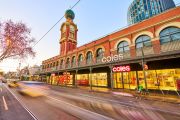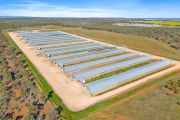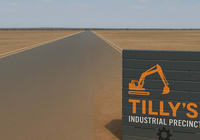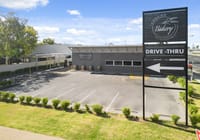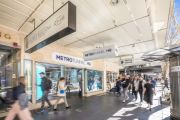
Melbourne’s Mecca superstore developer chases more cash
The real estate trust redeveloping a major Bourke Street site that will be home to Mecca’s Melbourne superstore has been forced to raise more money at just one-third of its original value and told existing investors they will not be able to sell out for years.
Newmark Capital’s Bourke Street Mall Trust raised $90 million in 2020, at the height of the COVID-19 pandemic, to redevelop the six-storey, 1930s building in the centre of Melbourne’s CBD. The building, a former David Jones department store, will be home to a three-storey Mecca boutique that is three times the size of its Sydney flagship outlet.

But the funds management group has tried to raise at least another $40 million to maintain its working capital and lower its leverage.
The building was originally expected to be finished in 2023. It is now raising another $2.5 million in an offer priced at 36.75¢ per unit. The original units were priced at $1 a piece. Their value is now 45¢ each, according to documents circulated to investors.
The rent Mecca pays is at the centre of the property’s value, and the trust has told investors it expects the store to achieve annual sales of $100 million. Mecca reported revenues of $1.2 billion in the 12 months to the end of June 2023, accounts filed with the corporate regulator last month show.
Newmark is a funds management house run by former Hawthorn Football Club legend Chris Langford, and has a number of unlisted trusts including the Bourke Street vehicle.
It owns the Como Centre in South Yarra, the Gateway Plaza in Warrnambool. It owned the Jam Factory, also in South Yarra, but sold to billionaire developer Tim Gurner.
But its struggles financing and building the Bourke Street development highlight the way a sluggish Victorian economy and, more broadly, rising construction costs, are hurting private asset investors.
Private assets, such as property and private credit have been marketed increasingly to wealthy individuals who have been pitched an opportunity to gain access to investments that had previously been limited to large institutions.
At the same time, retail rents in prime locations like the Melbourne CBD have been slow to rise. Even as those in Sydney and Brisbane jumped once the pandemic receded, Melbourne’s have been slower to return.
More recently, however, according to research published by realty CBRE, CBD vacancies have dropped to their lowest level since 2021, although they remain above the long-term average of around 4 per cent.
Zelman Ainsworth, a leasing specialist at Ainsworth Property, said the Melbourne retail market had felt the “short-term negative impact” of the redevelopment of a number of iconic city buildings since the pandemic.
“But now it’s all been delivered successfully at the same time, we anticipate a rejuvenation of the Melbourne CBD,” Zelman added.

But Newmark has told investors in the Bourke Street Mall Trust that they should not expect any of their money back until 2028. Distributions are also on hold, despite the trust originally telling investors they would have the chance to redeem some of their money after three years and six years.
The trust said that it needed to raise $2.5 million – even as Clemenger and menswear retailer Rodd & Gunn moved in – to continue to operate.
“Should this amount not be raised, the trust may not have sufficient working capital in the event that unknown costs or events arise. If this occurs, the trust may need to divest the property,” Newmarket told investors. “There is a risk that should this event arise it is likely that the property would be sold for a price at or below the most recent independent valuation.”

The Bourke Street trust tried to raise $30 million through a rights issue in March last year, but managed only $22.8 million.
In December, it tried to raise $10 million “to complete the refinance and retain the property until market conditions recover”. Just $6.1 million of that was collected, with another $5 million subsequently provided by two existing investors.
The trust also has a debt facility with an undisclosed bank of $170 million.
The original offer was promoted by Partners Wealth Group’s Partners Private unit, which offers its clients’ investment opportunities in private investments, such as property, private equity and private credit.
Clients of the wealth management firm were offered up to $30 million Class B units which were scheduled to be repaid within three years with a debt refinancing once the refurbishment was complete.
Newmark acquired the Bourke Street site for $121 million in July 2020. The redevelopment was first valued on an “as if complete” basis at $225 million, and then revalued to $232.5 million last year.

Newmark told investors as part of the latest raise they would only get the advertised 104 per cent return on their investment were they to sell the property for at least $270 million.
Langford, the fund’s managing director, said the market was improving.
“The trust was forecast to provide a potential (limited) liquidity event at completion of the refurbishment phase, subject to market conditions,” he said. “The property is an iconic landmark in a prime location, and Newmark is confident [it] will benefit from improving market conditions.”
Newmark has had previous issues. Last year its loss-making Newmark Property REIT – mostly made up of Bunnings stores – was taken over by Bunnings landlord BWP Trust for 17 per cent below the net value of the ASX-listed property fund’s assets, a move which rankled shareholders.

